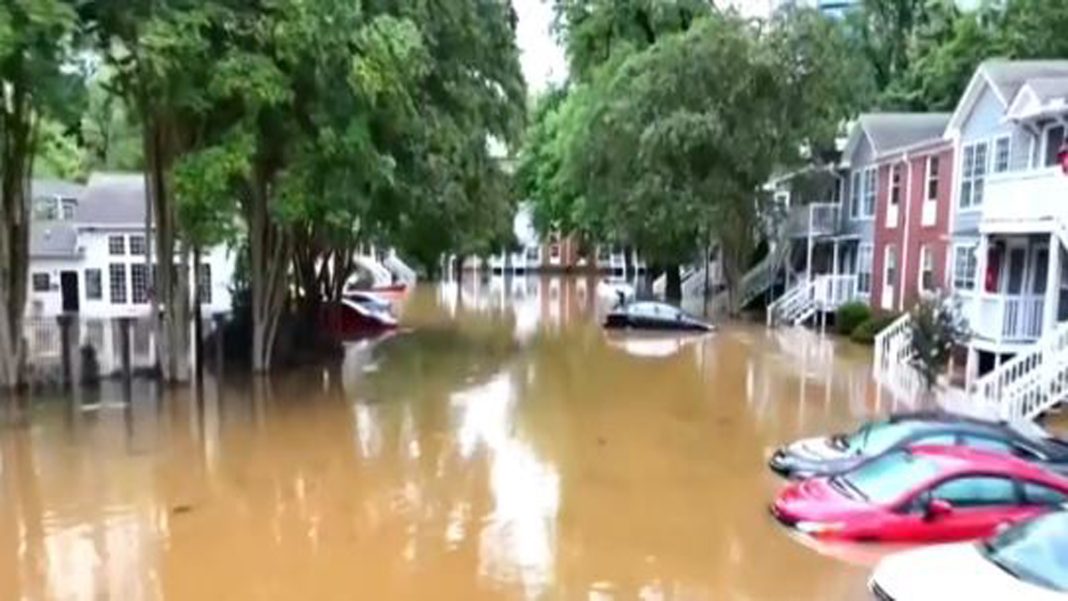**Hurricane Helene: A Devastating Impact on Florida and Beyond**
As the sun set on Friday, a grim reality settled over Florida and the southeastern United States following the catastrophic impact of Hurricane Helene. This Category 4 hurricane, which made landfall with maximum sustained winds of 140 mph, has left an indelible mark of destruction, claiming at least 44 lives across multiple states and causing extensive property damage estimated between $15 billion and $26 billion, according to Moody’s Analytics.
The storm’s fury was felt from the sparsely populated fishing villages of Florida’s Big Bend area to the bustling cities of North Carolina and Virginia. Among the tragic fatalities were three firefighters and a mother with her one-month-old twins, highlighting the storm’s indiscriminate nature and the deepening toll on first responders who rushed to aid those in peril. The devastation was compounded by fallen trees that crushed homes, with an 89-year-old woman tragically losing her life when a tree struck her residence.
As rescue crews embarked on desperate missions to save those trapped in floodwaters, the extent of the damage became increasingly clear. In Georgia, Governor Brian Kemp reported that chainsaws were required to clear debris and restore access to roads. The storm had knocked out power to significant infrastructure, including hospitals, leaving communities in dire situations. A particularly harrowing scene unfolded in northeastern Tennessee, where 54 individuals were hoisted to the roof of the Unicoi County Hospital as floodwaters surged around them. Fortunately, all were rescued, but the rapid escalation of the situation illuminated the precariousness of life in the storm’s wake.
Helene’s assault was underscored by extreme weather phenomena that have become alarmingly familiar in recent years. Atlanta, for instance, recorded a staggering 11.12 inches of rain within 48 hours—the highest in a two-day span since record-keeping began in 1878. Such extremes prompt a critical examination of climate change’s role in intensifying storms. A 2021 study from the National Oceanic and Atmospheric Administration (NOAA) suggested that warmer ocean temperatures can lead to rapid hurricane intensification; Helene’s swift transition from a tropical storm to a powerful cyclone exemplified this phenomenon.
In the aftermath, the personal narratives of those affected capture the emotional toll of such disasters. Laurie Lilliott, a resident of Dekle Beach, shared the shock of returning home only to find her house in ruins, a stark reminder of nature’s wrath. “It took me a long time to breathe,” she recounted, emphasizing the psychological weight that accompanies such loss. The community, which has faced three hurricanes since August 2023, is grappling with a resilience that is both commendable and heartbreaking.
The Federal Emergency Management Agency (FEMA) rapidly mobilized, deploying over 1,500 workers to assist with rescues and recovery efforts. President Joe Biden extended his condolences and support, acknowledging the scale of the disaster and the resilience needed to rebuild. Yet, as power outages plagued more than 3 million homes and businesses across Florida, Georgia, and the Carolinas, the immediate challenges of restoring normalcy loomed large.
In North Carolina, emergency services faced a deluge of calls, with over 3,300 logged in just eight hours. The situation was dire, with multiple mudslides reported, including one that blocked an interstate highway at the North Carolina-Tennessee border. As communities braced for potential flooding that could surpass anything seen in the past century, evacuations and road closures became necessary precautions.
In the broader context of the Atlantic hurricane season, Helene marks the eighth named storm, a reminder of the unpredictable nature of these weather events. With forecasters predicting above-average activity due to record-warm ocean temperatures, communities must remain vigilant and prepared for the storms that lie ahead.
As the recovery effort begins, the stories of loss and resilience resonate deeply. The scars left by Hurricane Helene will undoubtedly shape the future of the affected regions, but they also serve as a call to action for greater focus on climate resilience and infrastructure preparedness. The collective experience of this disaster underscores the need for ongoing dialogue about the impacts of climate change and the urgent need for comprehensive strategies to mitigate future risks.
In the face of adversity, it is the human spirit that shines brightest. Communities across the southeastern U.S. will come together to rebuild, drawing strength from one another as they navigate the long road to recovery.

